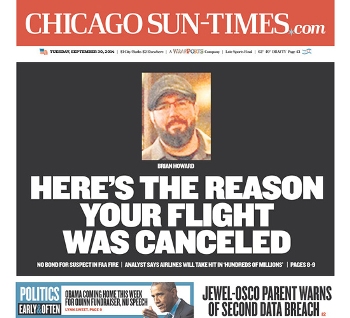Today's Sun-Times Front Page Causes A Stir
By Chuck Sudo in News on Sep 30, 2014 9:50PM
 The cover to Tuesday’s Sun-Times has caused a stir among media types and others regarding whether it was appropriate or if it sensationalized the continuing story of last Friday’s Aurora Federal Aviation Administration radar facility fire and the culpability of Brian Howard, the man charged with starting it.
The cover to Tuesday’s Sun-Times has caused a stir among media types and others regarding whether it was appropriate or if it sensationalized the continuing story of last Friday’s Aurora Federal Aviation Administration radar facility fire and the culpability of Brian Howard, the man charged with starting it.
As you can see in the image to the right, the Sun-Times features a photo of Howard with the tabloidish headline, “Here’s the reason your flight was canceled.” Many took it to make light, if not ignore, the mental issues that led Howard to attempt suicide at and set fire to the radar facility last week. One local journalist emailed media critic Jim Romenesko, “Interesting way to handle a story about a mentally ill man.” WBEZ “Afternoon Shift” producer Justin Kaufmann posted the front page to Facebook and called out the Bright One. “What do you want us to do? Kill him?” Kaufmann wrote. The debate that followed included a reply from Sun-Times columnist Neil Steinberg, who called the front page “edgy and interesting.”
“We’re a newspaper, not a social service,” Steinberg added.
Except that a newspaper is a social service, one intended to inform and report the facts. Kaufmann took the debate over the front page to the “Afternoon Shift,” where host Niala Boodhoo read the Society of Professional Journalists’ Code of Ethics section on minimizing harm.
Ethical journalism treats sources, subjects, colleagues and members of the public as human beings deserving of respect.Journalists should:
- Balance the public’s need for information against potential harm or discomfort. Pursuit of the news is not a license for arrogance or undue intrusiveness.
- Show compassion for those who may be affected by news coverage. Use heightened sensitivity when dealing with juveniles, victims of sex crimes, and sources or subjects who are inexperienced or unable to give consent. Consider cultural differences in approach and treatment.
- Recognize that legal access to information differs from an ethical justification to publish or broadcast.
- Realize that private people have a greater right to control information about themselves than public figures and others who seek power, influence or attention. Weigh the consequences of publishing or broadcasting personal information.
- Avoid pandering to lurid curiosity, even if others do.
- Balance a suspect’s right to a fair trial with the public’s right to know. Consider the implications of identifying criminal suspects before they face legal charges.
- Consider the long-term implications of the extended reach and permanence of publication. Provide updated and more complete information as appropriate.
Based on that language, the Sun-Times’ front page doesn’t pass muster. It panders to lurid curiosity. The assumption that Howard was solely responsible for the canceled and delayed flights at O’Hare and Midway Airports reeks of arrogance. It fails to show compassion for Howard’s mental issues. And it convicts Howard of the crime before he’s had his time in court.
Not to mention the headline isn’t factually correct. As Scott Smith notes, the reason for Friday’s air travel cock-up was because the FAA didn’t have a contingency plan in place when a radar facility like the one in Aurora (or in Elgin earlier this year) catches fire. The fire was, at most, one of two reasons for the mass cancellations and delays, but it wasn’t the reason. “(A)t some point,” Smith writes, “the front page of a newspaper has to not sound like the boozed-up guy on a barstool at O’Hare who missed his flight to Cleveland.”
This isn’t the first time the Sun-Times courted controversy with a front page headline. Their July 7, 2013 edition, with the crash of Asiana Airlines Flight 214 in San Francisco on the cover, read “Fright 214,” a headline that drew a stern rebuke from the Asian American Journalists Association as another example of “Engrish” in the media, not to mention being insensitive.
We have friends at the Sun-Times who have endured the stress and struggles at the paper dating back to at least the Conrad Black/Hollinger era, and still put forth their best efforts in informing readers. But the Sun-Times failed big time here today.